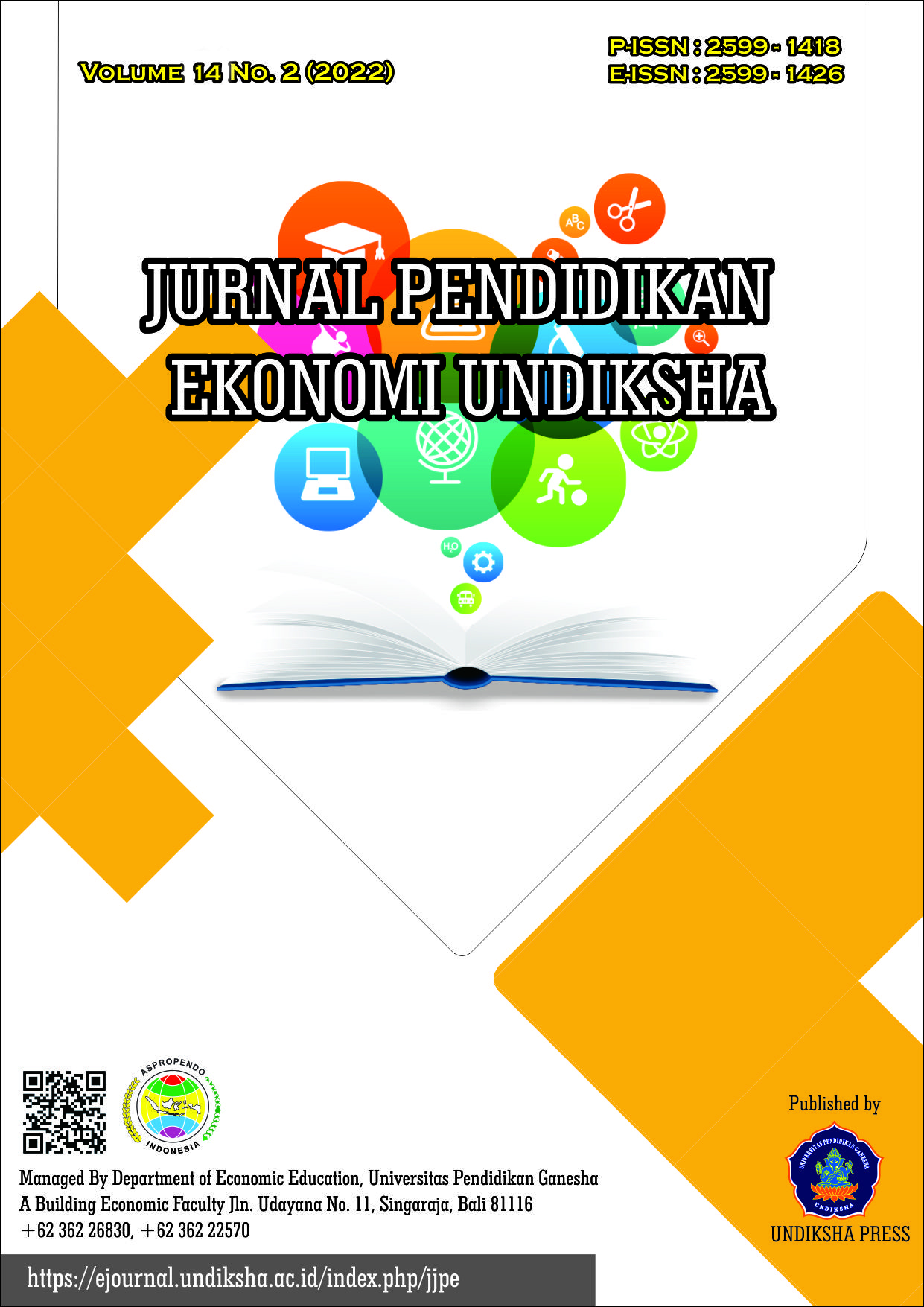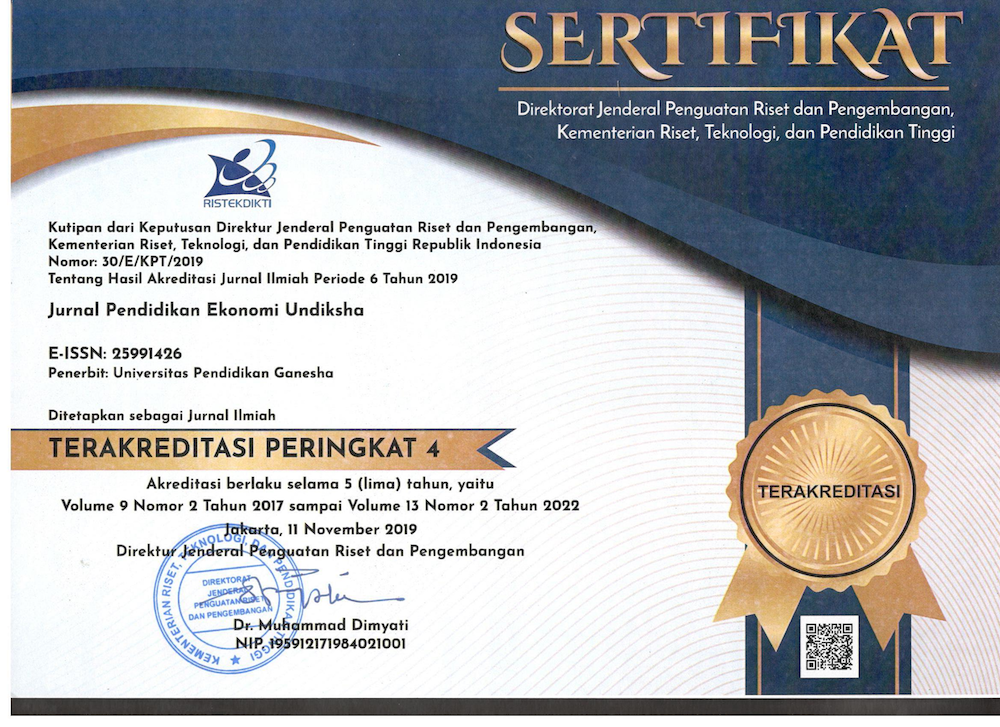Efektivitas Bahan Ajar E-Book Berbasis Android Menggunakan Metode Scaffolding Pada Mata Pelajaran Ekonomi di MA Negeri Bangkalan
DOI:
https://doi.org/10.23887/jjpe.v14i2.53606Keywords:
E-Books, Android, scaffolding, economic lessonsAbstract
In the current era of revolution 4.0, the demands for renewal in the field of education are getting higher. As in the current post-pandemic period, the need for more practical and effective teaching materials is needed, balanced with the use of learning methods that are able to provide convenience and adapt to student learning styles. such as the use of teaching materials in the form of electronic books (E-books) which are packaged in the form of android-based learning media. Where the E-Book here also applies the scaffolding method as a form of assistance in the form of clues or instructions related to material that is quite difficult to understand. the type of research carried out is R&D (Research & Development) by adapting the development model of Thiagarajan, Semmel & Semmel (1974). The results of the study obtained a feasibility level of 85.6% with the criteria of "very feasible", the level of effectiveness of the N-Gain Score results of 82.99% "very effective" and from the results of the Paeired T test the sample test obtained a sig value < of 0.05. The results of student responses are 85.5% and 86.75% with the criteria of "very feasible". And the practicality level of the E-book is 92% with the "very practical" criteria
References
Ardhi, A., & Wilujng, I. (2017). Developing Physics E-Scaffolding Teaching Media to Increase - Students ’ Problem Solving Ability and Scientific Attitude. 12(4), 729–745.
Avhors, F. (2014). of e-books in science : case study of University of Delhi. https://doi.org/10.1108 -12-2010-0159
Chaiani, Z. (2015). Scaffolding dalam pembelajaran matematika. Didactic: 1(1),39–44. https://doi.org/4/math.v1i1.93
Fojtk, R. (2015). Ebooks and Mobile Devices. Procedia - Social and Behavioral Sciences, 182, 742. https://doi.org/10.1016/j. ro.2015.04.824
Gonz, J. C. (2013). Developmant of inteructive books for Control Education. https://doi.org/10.3182/201828-3-U.08
Hasmidyani, D. (2016). Pendekatan Scaffolding Sebagai Upaya. Jurnal 3(1), 87–100.
Howll, E., & Howell,. (2018). Sca ff olding multimodality : writing process , collaboration and digital tools. https://doi.org/10.1108/857 017-0053
]soh, J. (2021). Learning , Culture and Social Interaction “ You really brought all your feelings out ” – Scaffolding students to identify the socio-emotional and socio challenges in collaborative. 30(June).
Mohamed, M. A. E., & Rahman, S. A. . (2015). The effect of interactive E-Book on students’ achievemunt at Najran University in education course. Journal of Education and Practice, 6(29), 71–83.
Mohammed, M., & Ebied,. (2015). The effict of interoctive e-book on students ’ achievement at Najran University in computer in education course., 71–83.
Puspitasari, R., Hamdoni., & Risdianto, E. (2020). PENGEMBANGAN EMODUL BERBANTUAN FLIPBOOK.3(3),247–254.
Rello, L., Kanvinde, G., & Baeza-Yates, R. (2012). A mobile application for accessible ebooks with dyslexia. Procedia Computer Science, 14(Dsai), 226–233. https://doi.org/10.1016/j.prucs.2012.10.026
Saman, M. ., & H, s. K. (2017). E-Scaffolding untuk Meningkatkan Kemampuan Pemecahan Masalah Fisika. 219–225.
Sari, M., Murti, S. R., Habiby, M., N. (2021). Pengembangan Bahan Ajar E-Book Interaktif Berbantuan 3D Pageflip Profesional Pada Materi Aritmetika Sosial. 05(01), 7879–802.
BSNP. 2014. Instrumen Penilaian Buku Teks Pelajaran SMA/MA Komponen Kelayakan Kegrafikan. (Online), (http://bsnp-indonesia .org.id, diakses unduh pada 9 Januari 2022).
BSNP. 2014a. Instrumen Penilaian Buku Teks Pelajaran Ekonomi (Buku Siswa) SMA/MA. (Online), (http://bsnp-indonesia .org.id, diakses unduh pada 9 Januari 2022).
Downloads
Published
How to Cite
Issue
Section
License
Copyright (c) 2022 Jurnal Pendidikan Ekonomi Undiksha

This work is licensed under a Creative Commons Attribution-ShareAlike 4.0 International License.





